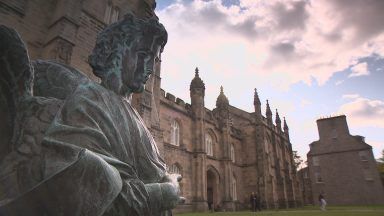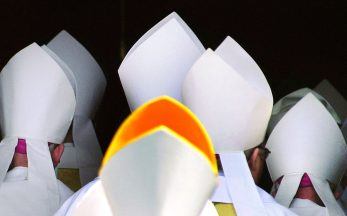As the Queen’s funeral cortege made its way from Balmoral to the Palace of Holyroodhouse in Edinburgh, impressive crowds lined the route in a dedicated show of dignified respect.
On the Royal Mile, thousands packed the pavements some breaking into quiet applause as some threw flowers in tribute.
It was a scene that was simultaneously respectful and warm without being overly defined by a shallow sentimentality.
The royal biographer Robert Lacy observed on TV that the reaction was very British, by which I think he meant appropriately sombre without descending into a communal wallowing in self-pity.
Every frame of this hugely significant national event is broadcast live. Television has a difficult job on these occasions and striking the right tone is not always easy when millions are glued waiting to sniff a hint of inappropriateness.
TV also has to be careful not to be a conductor for national grief, rather to report accurately how people are responding to the news.
It is not always easy, and you will find a bit of online criticism of some of the tone.
During the platinum Jubilee celebrations, it was pretty difficult to find any perceptible outpouring in Scotland. Events seemed far fewer in number and much lower key compared to those in England.
It was therefore significant to watch the crowds yesterday, for it seemed that the magnitude of the sovereign’s death effortlessly registered as an event without precedent in their lifetime.
I have always been intrigued by the attitude of people to the death of folk that they have never met, yet feel they know.
Queen Elizabeth II is perhaps unique in that regard. Her reign is of such longevity that only a dedicated hermit could not have formed a view of her and her long years of service.
She always towered above the political fray and stood apart as a royal untainted by character flaws or exhibiting behaviour that brought the institution into disrepute.
She seemed to transcend any legitimate criticism of her family and earned for her a respect grounded in long service.
That people felt they knew her is testament to a personality that always came across as natural.
Yes, much of it was honed by advisers behind the scenes, but she always managed to appear unspun and it was something that people detected for themselves.
In the fullness of time, a debate will naturally arise about the future of the monarchy in the age of Charles. His mother has endowed foundations that look unshakeable.
He will know that will gift to him a honeymoon period in which he can fashion the institution in his own image, put his stamp on the discharge of his constitutional role.
He is a much more vulnerable person than his mother since his life has been charted and indeed pulled apart in the less forgiving age in which he has been a public figure.
Chief among his tasks may be to establish the royal family as a ‘family’ and to put an end to the soap opera that surrounds his sons.
The demands of the institution may sit uneasily with his fatherly instincts not to take sides in what is clearly a fractious relationship.
He also has to become enslaved to the protocols of a constitutional monarch and resile from previously held views on issue of public policy.
For the moment, though, it is his mother’s presence that is still perceptible, even in death. She has caused a nation to pause and reflect on one of the great anchors of national life.
The future of that anchor rests on the shoulders of Charles III.
Follow STV News on WhatsApp
Scan the QR code on your mobile device for all the latest news from around the country





























